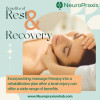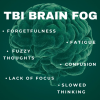Sex drive, or libido, is an indvidual’s desire to engage in sexual activity. It allows us to express ourselves sexually and/or be intimate with our partners. After a traumatic brain injury, an individual can experience changes in sexual behavior. These may include:
- Reduced libido or increased libido
- Decreased arousal
- Erectile problems for men
- Inability to climax or reach orgasm
- Inappropriate sexual behavior (i.e., masterbating in front of people)
- Reproductive changes (i.e., irregular menstrual cycles for women, decreased sperm production for men)
Other factors may also play a role in an individual’s sexual problems. These include:
| Factor | Description |
| Depression, anxiety, or stress | These conditions can reduce sex drive. |
| Medications | Some medications, such as antidepressants, can reduce libido. |
| Relationship problems | A couple with relationship problems are less likely to have sex. |
| Prior sexual difficulties | A brain injury can worsen any prior sexual problems that an individual had before the injury. |
| Reduced confidence | An individual with a brain injury may feel less confident or attractive, which makes them less likely to feel sexual or engage in sexual activity. |
| Other associated injuries | Any other injuries acquired from the accident (i.e., spinal cord injury) can affect an individual’s sexual functioning. |
| Other illnesses | Other illnesses that an individual may have (i.e., diabetes, high blood pressure) can reduce sexual drive |
General strategies that an individual with TBI can utilize to help with sexual problems are:
- Talk to a doctor or health professional who you feel comfortable talking with about your sexual problems
- Consider sex therapy, psychotherapy, or counseling to help with emotional issues related to your sexual problems
- Discuss with your partner to plan sexual activities during the time of day when you’re feeling less tired
- Talk with your partner about different positions to try to prevent any pain or balance issues
- Limit distractions in the environment where sexual activity is taking place so you can focus more on sex
- Use sexual aids to help with sexual arousal (i.e., watch erotic videos or look at erotic pictures)
References:
https://msktc.org/tbi/factsheets/sexuality-after-traumatic-brain-injury



